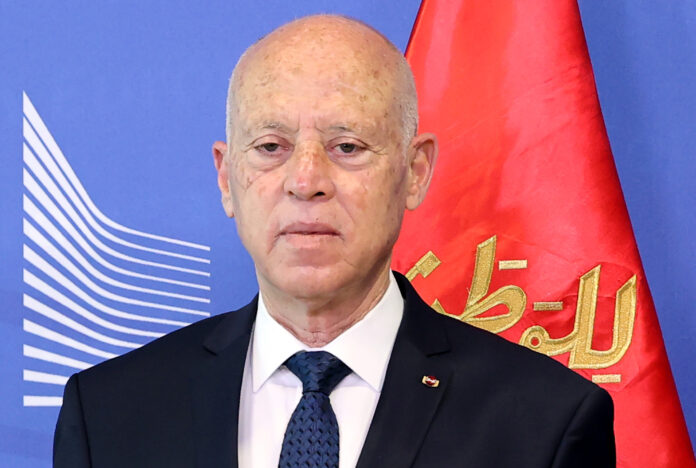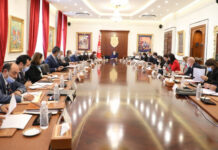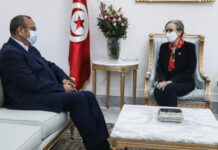
It is clear that efforts to mobilize support are still continuing by the higher institutions of the state, as there have been numerous visits and meetings with state officials in the recent period, in search of investments and financial resources to mobilize the state budget, specifically by President Kais Saied and Prime Minister Hichem Mechichi.
These visits were not only intended to mobilize support, but also to seek an approach to countering irregular migration, which has greatly exacerbated in recent months. In the face of the significant increase in the number of irregular migrants, European pressure has escalated to search for a solution to this dilemma. After the visit of the Italian Minister of Interior last month to Tunisia, the President of the Republic turned to Italy on an official two-day visit during which he was awarded an honorary doctorate in academic research.
Kais Saied began his official visit to the Italian Republic by holding a private conversation with Italian President Sargio Mattarella at the Presidential Palace in Rome, followed by an expanded session that included the delegations of the two countries. During this meeting, the Head of State stressed the ancient human and historical ties that unite Tunisia and Italy, as well as civilizational and cultural commonalities and firm principles that would be the starting point for a new common future based on a set of human values, economic and investment interests, and commercial and cultural exchange in accordance with innovative visions and mechanisms and new concepts that are based on Common interest and good neighborliness.
A Comprehensive Approach to Address Irregular Migration
The President of the Republic stressed Tunisia’s keenness to develop its economic cooperation with Italy, its friend and second trading partner in Europe. He called for Italy to continue to stand by Tunisia within a bilateral relationship and through the European Union, to support its efforts to achieve development and economic recovery, create jobs, enhance and diversify investments and support it in overcoming the economic and social difficulties that have intensified due to the repercussions of the Covid-19 pandemic.
Saied recalled Tunisia’s position on the issue of irregular migration, and stressed the need to address the real and deep causes of this phenomenon and to confront criminal networks that traffic in human beings on both sides of the Mediterranean, according to a comprehensive approach that is not limited to the security aspect only and restores hope for young people and creates job and development opportunities for them in their countries of origin. .
Increasing the Scholarship for Tunisian Students
For his part, the Italian President praised the depth of the friendly relations between the two countries and the high level of fruitful cooperation between Italy and Tunisia, the distinguished strategic partner. He indicated that the Italian people will not forget the initiative of the President of the Republic to send a medical team to the Brescia region in Italy, which was the region most affected by the Covid-19 pandemic in April 2020, and announced that Italy had decided to direct two planes to Tunisia loaded with various medical aid worth 1 million Euros to confront the pandemic. . The Italian president also indicated that his country would raise the number of scholarships allocated to Tunisian students wishing to study in Italy from 180 to 260.
200 Million Euros to Finance Development Projects
The Italian President reiterated his country’s readiness to continue supporting Tunisia in its efforts to mobilize the support of the European Union and international donor institutions in supporting efforts to achieve economic growth and social development and to overcome the negative repercussions of the Covid-19 pandemic, as well as to further encourage Italian investors to establish themselves in Tunisia in several sectors. He also pointed out the importance of continuing coordination to combat the phenomenon of irregular migration through a collective approach.
On the occasion of this visit, the two presidents signed a memorandum of understanding on Tunisian-Italian cooperation for development for the period 2021-2023, providing for the allocation of 200 million Euros to finance projects in development, economic recovery, agriculture, employment, training and youth integration. The meeting was also an occasion to exchange views on a number of regional and international files of common interest.
The Increase in the Number of Irregular Immigrants
Despite the memorandum of understanding that was signed and the aid provided by Italy to Tunisia, the irregular migration file was one of the most prominent incendiary files that were put on the table, a file that has been raised again and again in all visits.
The position of the President of the Republic is clear in this regard: the search for a comprehensive approach that is not limited to the security aspect only, one that restores hope for young people who aim to cross borders surreptitiously by creating jobs for them.
The file of irregular migration has become a concern for European countries, especially Italy, which continues to press for a solution to this dilemma, whatever the price it will offer, a phenomenon that has exacerbated in recent years, and according to statistics from the Tunisian Forum for Economic and Social Rights, 836 of Tunisian irregular migrants arrived at the Italian borders during the first 15 days of June, compared to 596 immigrants last May. According to a statement by the Forum’s spokesperson, Ramadan Ben Omar, Tunisia is witnessing a new wave of irregular migration, especially since the number of Tunisian irregular migrants arriving in Italy has witnessed a remarkable increase during the current year compared to previous years, reaching 2,817 immigrants in 2021, compared to 685 immigrants in 2020 and 347 immigrants in 2019.
Ben Omar linked the increase in failed border crossings in Tunisia with the growth of European security projects that could turn Tunisia into a fortress that prevents the arrival of irregular migrants, as is done by the office of the International Center for Migration Policy Development in Tunisia, which manages and coordinates the deployment of the multilateral border control system in Tunisia and abroad.
Partnership Strengthening
During his visit, Saeed had a conversation with Italian Prime Minister Mario Dragen. The Head of State praised the solid friendship ties that unite Tunisia and Italy and the traditions of fruitful cooperation in several fields. The President of the Republic reiterated Tunisia’s keenness to further strengthen and diversify these relations and provide the appropriate climate to attract foreign investments and overcome all difficulties that might encounter them.
The President of the Republic also called for the adoption of a comprehensive approach to address the phenomenon of irregular migration, not limited to the security dimension and addressing all manifestations of human trafficking on both sides of the Mediterranean.
For his part, Mario Draghi renewed his country’s support for Tunisia on its democratic path, and its readiness to continue supporting its actions with the European Union and international donor institutions in order to finance development programs.
He also indicated Italy’s aspiration to strengthen its partnerships with Tunisia in the economic and trade fields and in the migration file.










